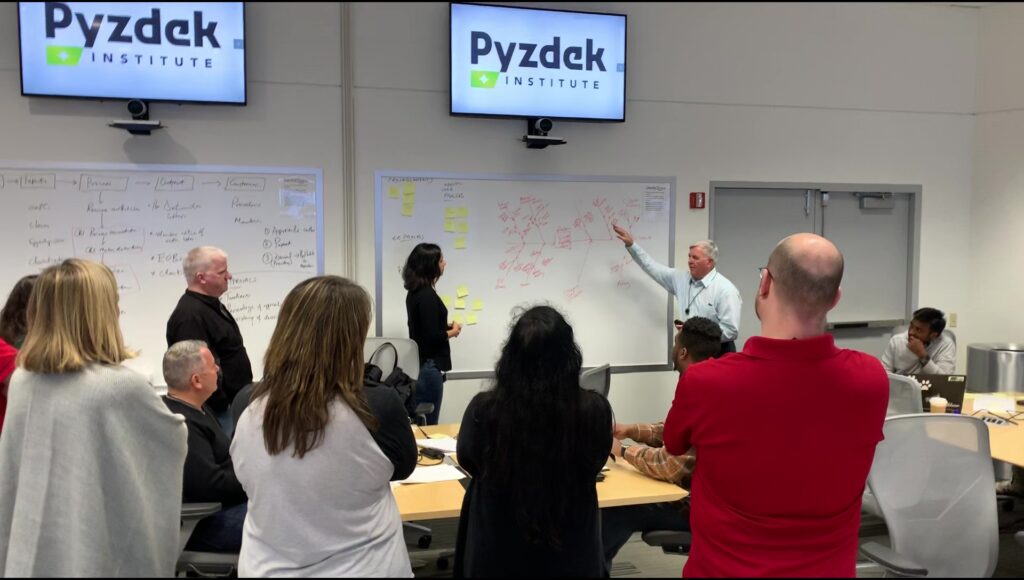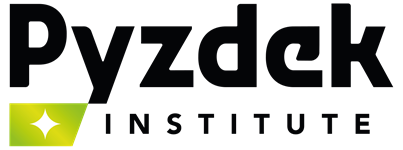
Process Optimization and DOE
Harness the potential of Design of Experiments for precise experimentation, robust analysis, and efficient process optimization.
Course Overview
The Pyzdek Institute Process Optimization and Design of Experiments workshop is hands-on and based on a systematic, error-proofed workflow. The workshop blends Lean Principles, process behavior charts, experiment design and process modeling to develop new products, solve difficult process problems, gain new knowledge, and maintain process stability. Attendees will learn about the “Work-Evaluate-Decide” sub-steps that help avoid common Process Optimization pitfalls and set the stage to make informed business decisions. The course content is relevant to the plastics, food processing, machining, aerospace, automotive and other manufacturing industries. A Certificate of Accomplishment is issued to attendees that regularly attend and demonstrate a good understanding of the course content.
- Format: Instructor-led
- Level: Intermediate
- Location: On-site, Online or Hybrid
- Duration: 24 Hours
Pre-requisites
The course can be taught with JMP® or Minitab®, statistical software. In either case, attendees should have a good understanding of software fundamentals including navigation, menu structure, data integrity, annotations, and graphing. The course includes a 2-hour online session for those without statistical software experience.
To get the most out of the course, attendees should have their own PC, a recent version of the statistical software, a 2-way headset and a webcam. Two monitors are highly recommended.
Live, Instructor-led Training from Certified Master Black Belts

The Pyzdek Institute Process Optimization and DOE course is delivered live by Certified Master Black Belts, who possess a wealth of experience in applying Lean Six Sigma methodologies and advanced statistical methods across a variety of industries. These seasoned experts not only hold the highest level of Lean Six Sigma certification, but also have a proven track record in leading successful process improvement initiatives.
They bring their practical knowledge to each training session, transforming complex theoretical concepts into actionable strategies. Their interactive approach ensures that participants are actively engaged, fostering a richer learning experience. They are adept at catering to different learning styles and can provide real-time feedback, making the learning process more personalized and effective.
In this course, you will be learning from the best, gaining insights from professionals who have successfully implemented the strategies they teach. With their guidance, you will be equipped to effectively apply statistical methods to reduce costs in your own organization.
Who is this Course Designed for?
This course is designed for R&D/Plant Engineers, Scientists, Supervisors, Managers, Technicians and Six Sigma Belts who need to optimize and maintain manufacturing and other industrial processes.
Benefits to attendees
- Multiply the effectiveness of Lean-based process improvement.
- Use an error-proofed workflow to improve processes, gain new process knowledge, increase corporate profits, and avoid common Process Optimization pitfalls.
- Minimize the cost of Process Optimization
- Analyze predictive models, interpret results and make smart business decisions in a collaborative environment.
- Exposure to many useful statistical principles
- Improve return on statistical software investment.
- Major contribution to Operational Excellence, quality award and similar programs
Course Structure
| Course content | % of time spent |
|---|---|
| Hands-on exercises & interpretation of results | 80% |
| Basic principles | 20% |
For both on-site and online, there are no lectures or PowerPoint presentations. Instead, the instructor uses the following steps for each agenda item.

Examples of Subjects Covered
- The DOE mindset and the importance of collaboration
- The Great Mathematical Quandary
- The 3-step Process Optimization workflow: Work-Evaluate-Decide
- The Process Optimization Workflow Record
- SPC fundamentals
- SPC as a method of experimentation
- DOE planning and economics
- How to minimize Process Optimization costs
- Screening experiments
- Interaction (factorial) experiments
- Response surface experiments
- Special considerations for mixtures
- Common DOE myths and pitfalls
Schedule options
- Six 4-hour segments spread over 4-5 weeks is recommended for online delivery.
- Three 8-hour sequential days are recommended for at-site delivery.
- Other scheduling based on customer need.
Ready to Elevate Your Expertise in Design of Experiments?
If our Process Optimization and Design of Experiments course aligns with your professional aspirations or the development needs of your team, we’re more than happy to delve into the details with you. Our Certified Master Black Belts stand ready to guide you through this comprehensive approach to problem-solving, essential for optimizing processes and maximizing efficiency in your field of work.
We appreciate that each organization has its unique characteristics, and we’re here to provide personalized guidance and answer any questions you may have. Whether you’re curious about the course content, scheduling, software requirements, or how this training can boost your role or industry, our team is keen to assist.
Contact us today to commence your journey towards mastery in Process Optimization and DOE.
